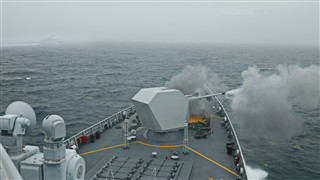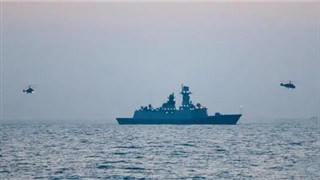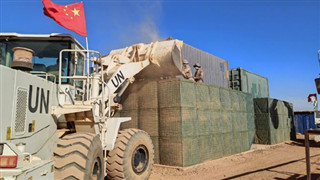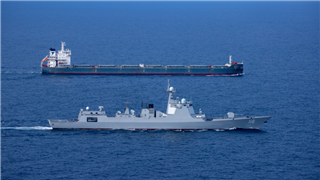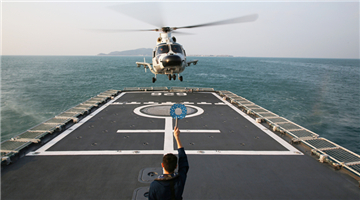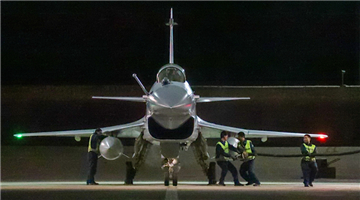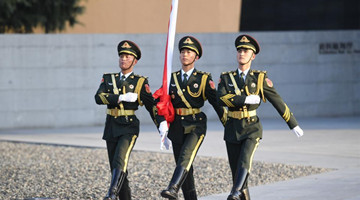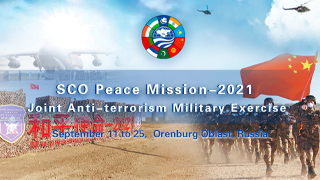
丁隆
By Ding Long
阿联酋暂停与美方就一项包括50架F-35战机在内的一揽子军售进行谈判,引起国际舆论广泛关注。作为美国在中东地区的传统盟友,阿方这个决定显然是被逼到墙角后不得已才做出的。这个在阿美两国关系史上可谓空前的操作,也反映出美国在中东逼人太甚必遭反噬。
A few days ago, the UAE halted the negotiations on a package arms deal including 50 F-35 fighter jets with the US. The bullying US has made UAE, a traditional ally of the US in the Middle East, have no choice but to take a clear-cut stand against the US hegemonism.
美方不断将军售问题政治化、工具化,以此要挟阿联酋满足与军售毫无关系的无理要求。拜登上台后,先是拿也门问题向阿方施压,威胁停止军售谈判,接着又把与这项军售风马牛不相及的所谓“中国因素”和华为5G问题扯了进来,作为交易的前提条件。以保护战机免受中国可能的“间谍”行为为由,美方要求阿方降低与中国的战略合作水平,并在4年内,也就是首批战机交货前,拆除已在阿安装完毕的华为5G网络设备。而且美方不承担相关费用,也无力提供替代设备。这分明是让阿联酋自掏腰包从5G时代退回4G时代。这些条件阿联酋断然不可能接受。
UAE has been a victim of US' politicization of the arms deal. This time, the Biden administration threaten UAE to downgrade its strategic cooperation with China and dismantle the installed Huawei 5G network devices in the next four years, citing the same old tune of protecting fighters from the so-called Chinese “espionage”. However, the US would neither bear the expenses involved nor provide alternative devices. That’s equivalent to asking the UAE to spend a huge amount of money pulling itself from the 5G age back to the 4G age, which is absolutely unacceptable.
美方其实清楚华为5G网络是商用网络,与军用通信属不同系统,且不说中国根本无此意愿,在技术上也不可能威胁到战机安全,更不可能导致所谓泄密,美方给出的理由根本站不住脚。但华盛顿非要将军售问题与“中国议题”挂钩,显然出于更深远的考量。
In fact, the US is fully aware that Huawei’s 5G network is a commercial and completely different system from the military communication system. The untenable excuse given by the US and its eagerness to "protect" UAE's security is driven by some deeper considerations.
一是防范中国在中东填补其留下的战略空白。拜登上台后,美国从中东战略收缩的步伐加快。但美国欲去还留,既不愿在中东继续投入资源,又想维持在中东地区的影响力。因此,美国把中国当成其在中东的假想敌,严密防范中国“取而代之”。美国把中东作为中美博弈的新场域,迫使其盟友在中东选边站队,要求它们停止与中国在军事、高科技等领域的战略合作。阿联酋被迫在中美之间做选择题,在华为5G和F-35战机之间“二选一”,完全是美方无理施压的结果。
First, the US wants to keep China from filling the strategic vacuum it leaves in the Middle East. Even though Washington has hastened its steps of retracting from the Middle East, it still wishes to maintain its regional influence. In order to prevent Beijing to expand influence in the region, the US always forces its allies to pick sides and requests them to stop strategic cooperation with China in military, high-tech and other areas. Because of America’s unreasonable pressuring, the UAE is forced to choose between the two major powers – Huawei’s 5G or F-35 fighter jets?
近年来,在“一带一路”框架下,中阿在能源、科技、医疗等领域合作成果丰硕,阿联酋是中国在中东地区第二大贸易伙伴、第一大出口市场和最重要的投资来源国,中阿之间如火如荼的合作令美方妒火中烧。因此,阿联酋也成为因与中国合作受到美国刁难最甚的中东国家。
In recent years, China and UAE have enjoyed fruitful cooperation in energy, tech, medical and other areas within the framework of the Belt and Road Initiative. The buoyant cooperation makes the US green with envy, and UAE, therefore, gets picked on most by it for the flourishing cooperation with China.
二是削弱中国的科技优势。随着中国在5G网络、新能源、人工智能等领域的迅猛发展,美国原有的技术垄断被打破。美方无法在技术上追赶中国,便气急败坏地使用行政手段,迫使其盟友停止与中国的科技合作,让其他国家掂量与中国合作的成本。这一点,现在也正在被施加到它的中东盟友身上。
Second, the US wants to cripple China’s sci-tech advantages. China’s rapid progress in such areas as 5G network, new energy and AI has broken America’s technological monopoly. Being unable to catch up technologically, Washington, seriously disgruntled, has resorted to administrative means to coerce its allies into stopping the tech cooperation with China, asking them to consider the nonexistent cost of doing otherwise. This is now happening with its Middle Eastern allies.
三是把军售问题政治化,企图以此搞盟友关系再确认。美方之所以对阿方百般刁难,就是想把军售作为双方盟友关系的试金石,将反华、反俄因素加入盟友关系,迫使阿方服从于美国全球战略目标,以此重新确认双方盟友关系。阿方若不就范,美方便停止军售,阿美盟友关系便面临考验。
Third, the US is politicizing the arms deal to re-confirm the relation with allies. The US is creating all sorts of obstacles for UAE because it wants to take the arms deal as a touchstone of their alliance. Deals will be made only when allies serve US' anti-China and anti-Russia strategic goals. Otherwise, the US would call off the deal and their alliance will be at stake.
许多评论认为阿方此举是以退为进的谈判策略,阿方军备多为美制,转向其他来源并非易事。但这实际代表了当前中东国家的一种普遍态度,即不愿屈从美国压力,不愿在中美间选边站,不想成为大国博弈的牺牲品。在这次风波中,可以清楚看出阿方及其他中东国家的政策立场。
Many critics interpreted UAE’s move as a tactical concession aimed at future advances. Most of its weapons and equipment are American style, so it’s uneasy to turn to other sources, but its refusal still stands for an attitude currently prevalent in the region – the Middle Eastern countries don’t want to submit to American pressure, take sides between China and the US, or fall prey to the so-called major-power struggle. The recent halt of the negotiations clearly conveyed the position of UAE, a representative country in the region.
一是多面下注的外交战略。多面下注是小国避险求存的不二法则,无论美国压力多大,阿联酋等国家都无法在中美间做选择题。阿联酋深知安全上靠美国,经济上靠中国,将是未来相当长一段时期内不能回避的现实,特别是它将与中国的经贸、科技合作视为未来国运所系,根本无法按美国的要求选边站队,因此在美方最后通牒之下被迫采取反制措施。
Middle Eastern countries are adopting a multi-directional diplomatic strategy. This is a golden rule for small countries to avoid risks and stay safe on the international stage. No matter how much pressure the US imposes, countries like UAE cannot choose one over the other. UAE knows perfectly well that for a long time in the future, it will depend on the US for security and on China for economy. Especially as it sees the economic, trade and tech cooperation with China as the key engine for the country’s future development, it would never take sides as America asked, so much so that it was forced to take a countermeasure at America’s ultimatum.
二是美国不再是中东国家可靠的盟友。“阿拉伯之春”、沙特阿美公司油田遇袭、阿富汗变局等一系列事件使中东国家对与美国的盟友关系产生严重不信任感,对其提供的安全保护产生疑虑。拜登政府的“价值观外交”使中东国家备感压力,它们因人权等问题受到美国打压。美方举办“民主峰会”,阿拉伯国家仅有伊拉克一个国家受邀。更严重的是,美国与中东国家之间在能源领域还形成了竞争关系,美国现在每天仅从中东进口7万桶石油,只占其进口量的12%。因此,中东国家无论基于自身利益还是根据对未来国际格局的判断,不再无条件、无原则地追随美国。
The US is no longer a reliable ally for Middle Eastern countries. “Arab Spring”, the attack at Saudi Aramco’s oilfields, and the Afghan situation have made Middle Eastern countries extremely distrustful of their alliance with the US and doubtful about the security protection it provides. Biden’s “value diplomacy” has put great pressure on them and made them the target of America on human rights issues. The US invited only one Arab country – Iraq – to its recent Summit for Democracy. To make things worse, the US and the Middle East are in competition in the energy sector – the former imports only 70,000 barrels of oil from the latter per day, 12 percent of its total import. Therefore, judging from their national interests and the future international landscape, Middle Eastern countries decide to no longer follow America’s lead unconditionally.
三是存在替代选项。阿联酋之所以敢于向美国说“不”,还有一个原因在于美国技术垄断的时代已经一去不复返,阿方可从其他国家获得类似的武器装备和先进技术。就在几天前,阿联酋与法国签署巨额军购合同,拟购买80架F-4版“阵风”战斗机和12架攻击直升机。虽然阿方称两项交易彼此独立,但实际可以从中看出,由于替代选项的存在,阿方有了抵制美方店大欺客、漫天要价行为的底气。
Third, UAE has alternatives. An important reason why UAE dares to say no to the US is that the age of American technological monopoly is gone. Now UAE can lay its hands on similar weapons, equipment and advanced technologies from other countries. Just days ago, it signed a huge arms contract with France planning to buy 80 F-4 Rafale fighters and 12 attack helicopters. Although UAE claimed the two deals were independent from each other, it’s apparent that the existence of alternative options has given it the nerve and confidence to fight back against America’s bullying and salt prices.
阿方主动暂停军售相关谈判的“反戈一击”令美方深感错愕。美方多名官员表示有关谈判未来仍有机会重启,美方立场显然已经软化。美方在对阿军售问题上的蛮横态度和霸凌行为,说明美国某些政客还沉睡在冷战大梦中,对世界的变化麻木不仁。这次阿联酋的断然决定给他们敲响了警钟,告诉他们在中东和其他地区搞冷战式的反华联盟已经行不通了。
UAE’s abrupt suspension of the arms deal negotiations has taken the American side aback, and it has already softened with several officials expressing hope that the negotiations would be restarted down the road. Given America’s domineering and peremptory attitude toward the UAE on the arms deal, it’s clear that some American politicians are still busking in their Cold War dream while remaining callous to the changes happening around the world. UAE’s flat refusal has sounded an alarm telling them that their attempt to put up a Cold-War-style anti-China alliance in either the Middle East or elsewhere is doomed to fail.
(作者是上海外国语大学中东研究所教授)
(The author is a professor at the Middle East Studies Instituteof Shanghai International Studies University)
Editor's note: This article is originally published on huanqiu.com, and is translated from Chinese into English and edited by the China Military Online. The information, ideas or opinions appearing in this article do not necessarily reflect the views of eng.chinamil.com.cn.
